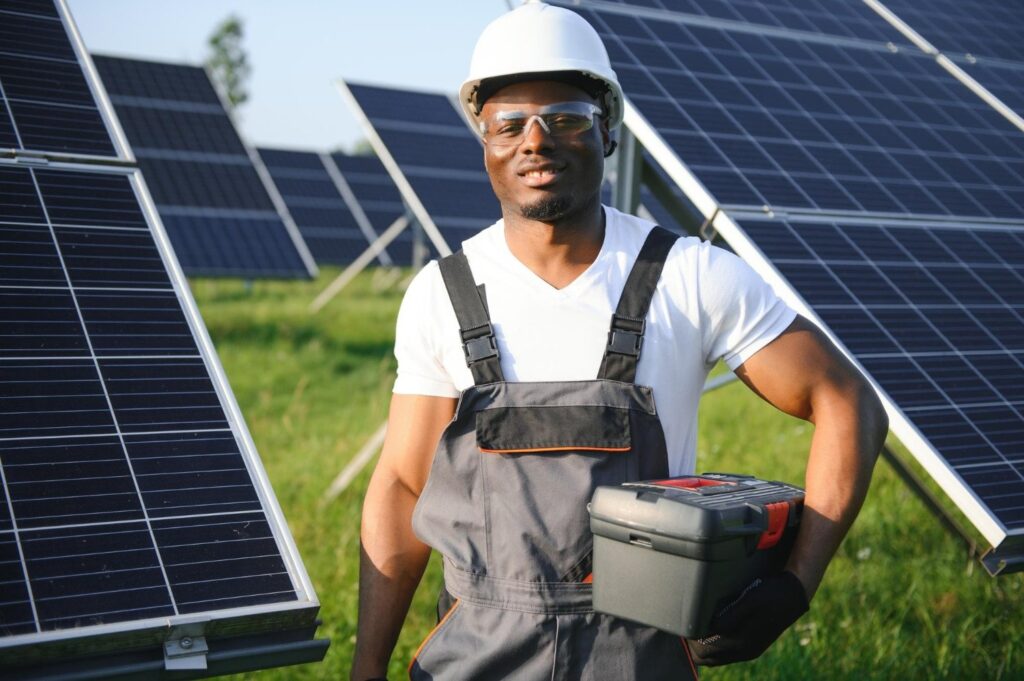How to Measure and Optimize Solar Power Efficiency for Your Home
Did you know that improving solar power efficiency can increase the energy output of your solar panels by up to 20%? As more homeowners in Ghana invest in solar energy, optimizing the efficiency of their systems becomes crucial for maximizing the return on investment.
Understanding how to measure and enhance solar power efficiency ensures that your home benefits from the maximum possible energy output, reducing both your carbon footprint and electricity bills.
In this guide, we’ll explore practical steps to measure and optimize the efficiency of your solar panels. By implementing these strategies, you can ensure your system operates at peak performance, providing reliable and sustainable energy for your home.
Whether you’re considering installing a new solar system or improving an existing one, this comprehensive guide will help you make informed decisions and get the most out of your investment in solar energy. Let’s dive into the essential aspects of solar power efficiency and how you can harness the full potential of your solar panels.

Understanding Solar Power Efficiency
Solar power efficiency refers to the ability of solar panels to convert sunlight into usable electricity. For residential solar panel installation, achieving high efficiency means more energy production and greater savings on electricity bills.
Efficient solar panels capture more sunlight and convert it into electrical energy, making them essential for optimizing the performance of your solar system.
Investing in high-efficiency solar panels ensures that you can still generate sufficient power for your home even with limited roof space or less-than-ideal sunlight conditions.
Understanding the factors that influence efficiency, such as panel quality, installation angle, and shading, helps homeowners make informed decisions about their solar investments.
Factors Affecting Solar Panel Efficiency
Several factors can impact the efficiency of your solar panels. For commercial solar panel installation, considerations such as the quality of the solar inverter, panel orientation, and the presence of shading are crucial.
High-quality solar inverters convert the DC power generated by the panels into AC power for use in your home, and their efficiency can significantly affect overall system performance.
Other factors include the type of solar panels used, with monocrystalline panels generally offering higher efficiency than polycrystalline ones.
The installation angle and the geographical location of your property also play a role, as they determine the amount of sunlight your panels receive throughout the day. Understanding these factors helps in selecting the best components and configurations for maximising efficiency.
Methods to Measure Solar Power Output
Accurately measuring the power output of your solar system is essential for assessing its efficiency. One common method is using a solar power meter, which directly measures the amount of electricity generated by your panels.
Additionally, most modern solar systems come with monitoring software that tracks energy production in real time, providing detailed insights into your system’s performance.
Another approach is to compare your system’s output against expected performance metrics, considering factors like panel wattage, sunlight hours, and seasonal variations.
Regularly monitoring these outputs helps identify any drops in efficiency, indicating the need for maintenance or adjustments.
Tips to Improve Solar Panel Efficiency
Enhancing solar power efficiency can lead to significant benefits for homeowners. One effective strategy is to ensure your solar panels are kept clean and free of debris, as dirt and dust can block sunlight and reduce performance.
Implementing a Battery Storage Solution can also improve efficiency by storing excess energy generated during the day for use at night or during cloudy periods.
Another tip is to optimize the angle and orientation of your panels to maximize sunlight exposure. Regularly trimming trees and removing obstacles that cast shadows on your panels can also help.
Additionally, investing in high-quality components and professional installation services can ensure your system operates at peak efficiency.
Regular Maintenance for Optimal Performance
Regular maintenance is crucial for ensuring the optimal performance of your solar panels. Routine inspections and cleaning help maintain their efficiency, preventing issues such as dirt buildup and shading from reducing energy output.
Partnering with a reliable Home Automation Service can simplify the maintenance process, providing automated alerts and scheduling regular check-ups.
In addition to cleaning, it’s important to inspect the system for any signs of wear or damage. Checking the solar inverter, wiring, and mounting hardware can help identify potential problems early.
Regular maintenance not only prolongs the lifespan of your solar panels but also ensures consistent energy production, maximizing your investment.

Upgrading Your Solar System for Better Efficiency
As technology advances, upgrading your solar system can significantly enhance its efficiency. Upgrading to newer, more efficient solar panels or inverters can increase energy production.
For homes with existing systems, adding a Battery Storage Solution can improve energy management, storing excess power for use during peak demand times.
Considering upgrades like smart inverters and advanced monitoring systems can also optimize performance.
These technologies provide real-time data and analytics, helping you make informed decisions about energy usage and system adjustments. Regularly evaluating and upgrading your solar components ensures that your system remains efficient and effective.
Final Thought
Investing in maintenance and support for your solar system is essential for ensuring long-term efficiency and reliability. Regular maintenance, including cleaning and inspections, helps maintain the performance of your solar panels and prevents potential issues. Partnering with professional solar installation companies in Ghana ensures that your system receives the necessary care and attention.
Prioritizing maintenance and support not only maximizes the efficiency of your solar system but also extends its lifespan.
By keeping your system in top condition, you can enjoy the benefits of renewable energy for years to come, contributing to a sustainable and eco-friendly future. Proper maintenance is the key to unlocking the full potential of your solar investment.
FAQs
What is solar power efficiency?
Solar power efficiency is the ratio of the energy output from solar panels to the energy input from sunlight.
What factors affect solar panel efficiency?
Factors include panel orientation, shading, temperature, and the quality of the solar cells.
How can I measure the efficiency of my solar panels?
You can measure efficiency by comparing the actual energy output to the expected output based on sunlight conditions.
What tools are used to measure solar power output?
Common tools include solar power meters, multimeters, and monitoring systems.
How can shading impact solar panel efficiency?
Shading can significantly reduce the amount of sunlight reaching the panels, decreasing their efficiency.
What are some tips to improve solar panel efficiency?
Ensure proper orientation, keep panels clean, and avoid shading.
How does regular maintenance affect solar panel efficiency?
Regular maintenance prevents dirt and debris buildup, ensuring maximum sunlight absorption.
Can upgrading my solar system improve efficiency?
Yes, upgrading to newer, more efficient panels or adding a tracking system can boost efficiency.
What is the best orientation for solar panels?
South-facing panels typically receive the most sunlight throughout the day in the Northern Hemisphere.
How does temperature affect solar panel efficiency?
High temperatures can reduce the efficiency of solar panels by increasing their resistance.
What are some advanced methods to optimize solar power efficiency?
Using micro-inverters, adding battery storage, and implementing a solar tracking system can optimize efficiency.
Why is monitoring solar power output important?
Monitoring helps identify performance issues and ensures your system operates at peak efficiency.
